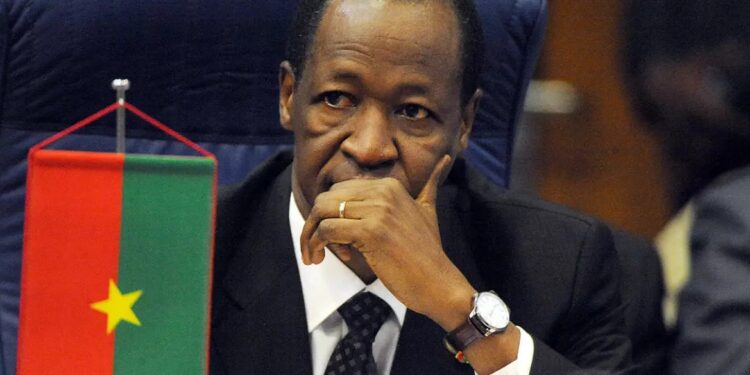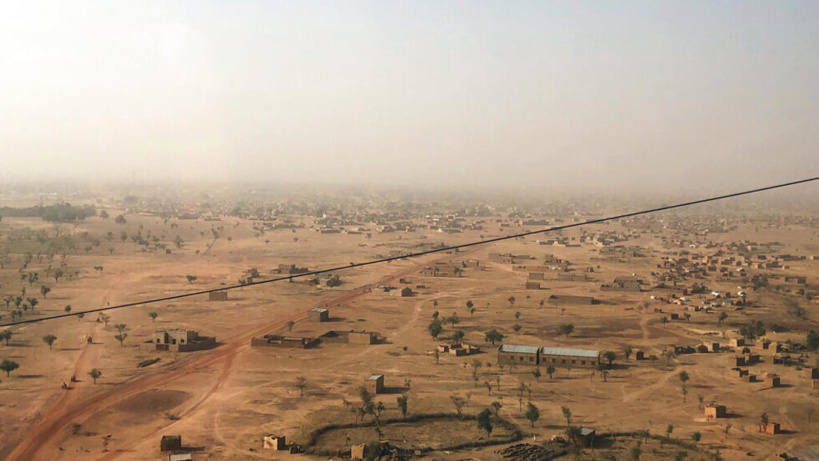BURKINA FASO
BURKINA FASO – Blaise Compaoré back in Ouagadougou

Since he lost power, following his overthrow by a popular insurrection in 2014, Blaise Compaoré has been in Côte d’Ivoire. Now of Ivorian nationality, he has not, since that date, returned to his country of origin. This has been done since this afternoon, Thursday, July 7, 2022. This return to Canada is part of national reconciliation.
President Compaoré’s desire to regain power after decades had triggered violent popular riots that forced him to go into exile in Côte d’Ivoire in October 2014. Today, eight years later, he is once again treading the soil of the land of men of integrity.
Lieutenant-Colonel Paul-Henri SANDAOGO DAMIBA, Head of State who leads the transition in Burkina Faso has undertaken contacts for the participation of former President Blaise COMPAORE in the reconciliation process in his country. Arrangements are being made to ensure the participation of the former President of Faso in this process.” , had already announced Mr. Amadou COULIBALY, Ivorian Minister of Communication and Digital Economy, Government Spokesman at the exit of the Council of Ministers on Wednesday, July 6, 2022.
As a reminder, Blaise Compaoré, was sentenced to life in prison after a trial that lasted six months, for his participation in the murder of his predecessor Thomas Sankara, killed with twelve of his companions during a coup in 1987. The military court of Ouagadougou also sentenced to life the commander of his guard Hyacinthe Kafando and General Gilbert Diendéré, one of the chiefs of the army during the putsch of 1987.
BURKINA FASO
BURKINA FASO – Ouagadougou and Dakar join forces to fight terrorism

The Senegalese Prime Minister, Ousmane Sonko made his first official visit to Burkina Faso on Friday, May 16, 2025. During this visit, he reaffirmed to Captain Ibrahim Traoré the willingness of Senegal to provide its support in the face of the terrorist threat in the Sahel.
On an official visit to Ouagadougou, Ousmane Sonko, Prime Minister of Senegal, was received in audience by the President of the Transition of Burkina Faso, Captain Ibrahim Traoré. Accompanied by three members of his government—Yassine Fall, Minister of Foreign Affairs and African Integration; Birame Diop, Minister of the Armed Forces; and Khady Diène Gaye, Minister of Sport — The head of the Senegalese government engaged in more diplomatic exchanges at the summit.
This first visit to Burkina Faso takes place against a background of high security tensions in the region. At the end of his meeting with President Traoré, Ousmane Sonko wished to express “the solidarity of the Senegalese people towards the people of Burkina Faso in the face of this test imposed on them, which they did not choose”. In addition, he provided “absolute support” to the transitional authorities and affirmed Senegal’s readiness to consider “any possibility of collaboration and support” in the face of the terrorist threat. He also stressed the need for a united and structured response, because, he said: “None of our countries can escape this gangrene”.
Ousmane Sonko, in his statements, calls for a collective approach to security in West Africa. He also said: “It is illusory to believe that the security threat will stop at the borders of Burkina Faso, Mali or Niger. It is a struggle of all West Africa”.
Ousmane Sonko not only spoke to Ouagadougou, but also to Bamako and Niamey.
Apart from the diplomatic issues, the visit of the Senegalese Prime Minister also has a historical dimension. Indeed, on Saturday, May 17, 2025, he took part in the inauguration of the Thomas Sankara Mausoleum, an emblematic figure of Pan-Africanism and its 12 companions in Ouagadougou. For the Senegalese Prime Minister, Thomas Sanka who is one of his master thinkers “has been illuminating all the pan-Africanist and sovereignist struggles on the continent for a few decades”. He also planned to meet with the Senegalese community living in Burkina Faso.
BURKINA FASO
BURKINA FASO – Draft revision of the constitution: The ESC and the Ombudsman of Faso removed, French will no longer be the official language

The adoption of a bill revising the Constitution, this is the main information from the Council of Ministers. As implications included in this bill, the Minister of Justice, Rodrigue Bayala, has indicated that French will become a working language and national languages will become official languages.
Institutions such as the Ombudsman of Faso and the Economic and Social Council (ESC) will also be abolished. Their duties and functions will be entrusted to an institution called the “Conseil national des communautés”. According to the minister in charge of justice, this new institution will be composed of religious leaders, customary and grassroots communities.
The transformation of the National Intelligence Agency into the National Security Council, a body that will be constitutionalized and the abolition of the High Court of Justice are also reforms contained in the draft text.
BURKINA FASO
BURKINA FASO – A major terrorist attack targets the city of Djibo in the Sahel

The city of Djibo, located in the Sahel region, was the subject of a terrorist attack in the afternoon of Sunday, November 26, 2023. Numerous assailants arrived by motorcycle and car stormed the camp of the group of anti-terrorist forces and several strategic sites of the city. For more than two hours, they shot at the people, burned and looted everything they could. For the moment, no official communication on the outcome of this attack.
According to the news agency of Burkina it is «nearly 3,000 terrorists» who attacked the city of Djibo. Witnesses on the spot explain that the attackers came in large numbers and attacked the strategic points of the city, including the camp of the military detachment.
“The fighting was particularly violent at the military camp,” Burkina Faso’s news agency said. For several hours, the attackers occupied it just like the rest of the city. A security source reveals that “soldiers fell, all collective weapons, all ammunition and armoured vehicles carried away.”
A counter-offensive was carried out and «more than 400 terrorists» killed, says the Burkina news agency. A figure that cannot be independently verified. In addition, the agency does not mention possible losses and material damage, on the side of the Burkinabe forces.
For more than two years, the city of Djibo has been under the blockade of armed terrorist groups. The inhabitants are supplied by a WFP airlift or by the rare convoys escorted by the army of Burkina Faso. These convoys are regularly attacked by armed terrorist groups.




